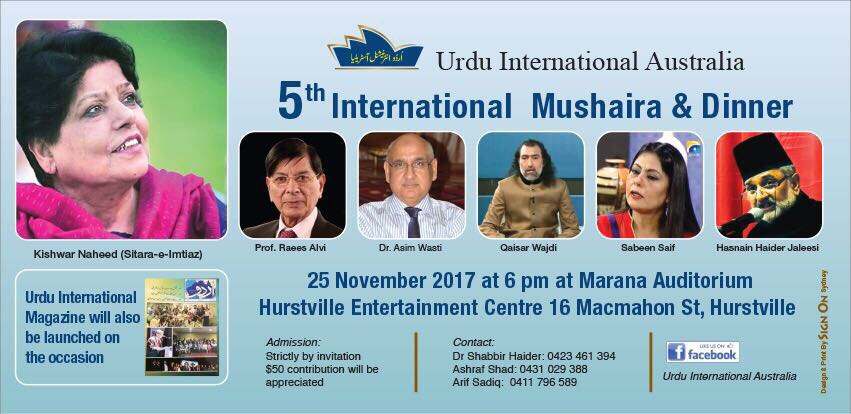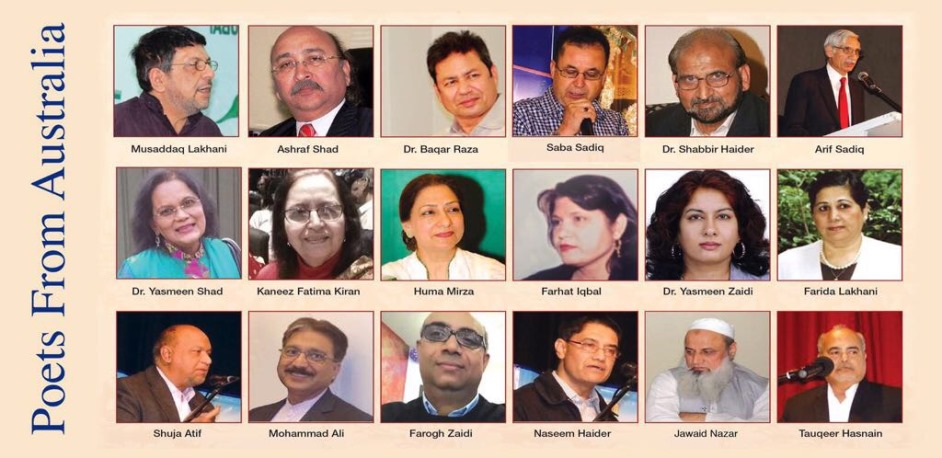




Sada-e-Watan
Sydney ™
sadaewatan@gmail.com






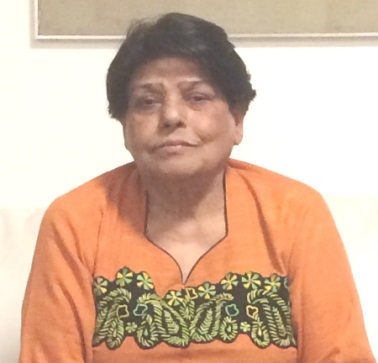
Kishwar Naheed - (Sydney on 24Nov 17)
Welcome
to Australia Eminent poet and writer Kishwar Naheed
(Syed Zafar Hussain, Editor-in-Chief Sada-e-Watan
Sydney)
Kishwar Naheed is an Urdu poet from Pakistan known primarily as a pioneering feminist poetry. On the invitation of” Urdu International” She arrived in Australia and staying in Sydney at the residence of prominent Writer Ashraf Shad & Dr Yasmeen Shad. Kishwar Naheed will be Chief Guest of 1Urdu International’s annual International Mushaira at Hurstville Sydney on the eve of Saturday, 25th Nov 2017. On the behalf of the Australian Pakistan Community the Editorial Board of “ Sada-e-Watan Sydney” welcome Kishwar Naheed in Australia and appreciates her Great Services for promoting Urdu poetry and her efforts for women’s rights.
Kishwar Naheed is living in Islamabad. I remember when I was in High School, Kishwar was Director General of Pakistan National Centre Lahore and that time Kishwar was living just behinds " Muslim League House" Lahore but later she moved to Capital of Pakistan. It is her second visit of Australia. In 1994, she also visited Sydney. During her short trip, Mr Ashraf Shad arranged a literary evening at the residence of Mr BM (Bashir Mirza) who was famous Pakistani painter artist and Cultural Attaché at Pakistan Consulate Sydney.
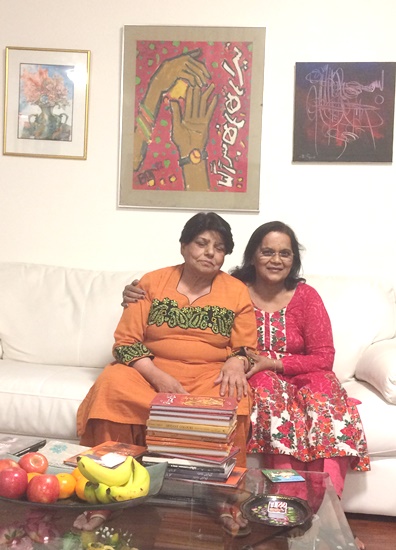
Kishwar Naheed and Dr Yasmeen Shad(Sydney)
Kishwar Naheed is Liberal Muslim and she never compromised or afraid to say truth. She is practically follower of Message of Imam Hussain. She writes Weekly column in the Leading Urdu newspaper of Pakistan Daily “Jang”. She writes about all important topics of current affairs, history, politics, women’s issues, Literary books, Personalities & Events.
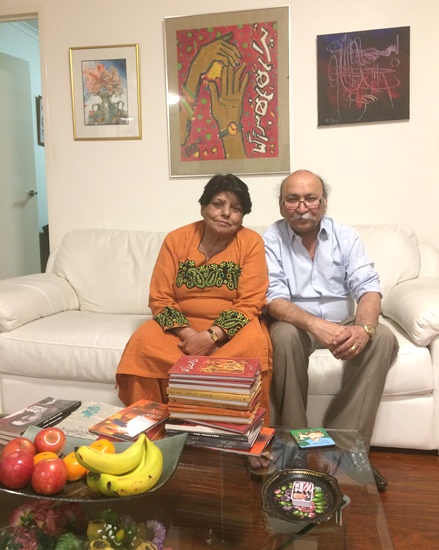
Kishwar Naheed and Ashraf Shad (24th Nov 2017- Sydney)
In Sada-e-Watan we are re-publishing her few columns with thanks of Jang Group of Newspapers. We are also including her Exclusive Interview with thanks of Herald- Dawn Pakistan. We selected Urdu Poetry of Kishwar Naheed from Urdu Point. We hope that Indo-Pak Community will enjoy highest standard poetry of Kishwar Naheed poetry in the Annual Mushaira of Urdu International. Mr. Ashraf Shad kindly make specially for Sada-e-Watan, these above 3 photos of Kishwar Naheed.
***********************************************
POEM BY KISHWAR NAHEED
a sudden line of poetry — ‘I Am Not That Woman,’
Kishwar Naheed I am not...
‘I Am Not
That Woman,’ Kishwar Naheed
I am not that woman
Selling you socks and shoes!
Remember
me, I am the one you hid
In your walls of stone, while you roamed
Free
as the breeze, not knowing
That my voice cannot be smothered by stones,
I am the one you crushed
With the weight of custom and tradition
Not knowing
That light cannot be hidden in darkness.
Remember me,
I am the one in whose lap
You picked flowers
And planted thorns and
embers
Not knowing
That chains cannot smother my fragrance
I am
the woman
Whom you bought and sold
************************************
Poetry of Kishwar Naheed
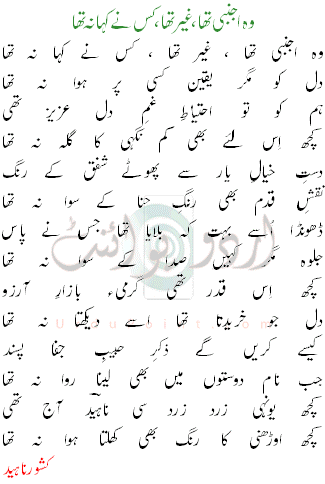
***************************

****************************
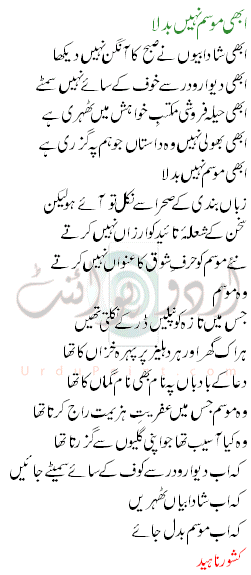
**************************

***************
For readers of Sada-e-Watan, 5 Urdu Column's of Kishwar Naheed published in Daily "Jang" Pakistan
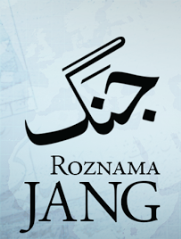
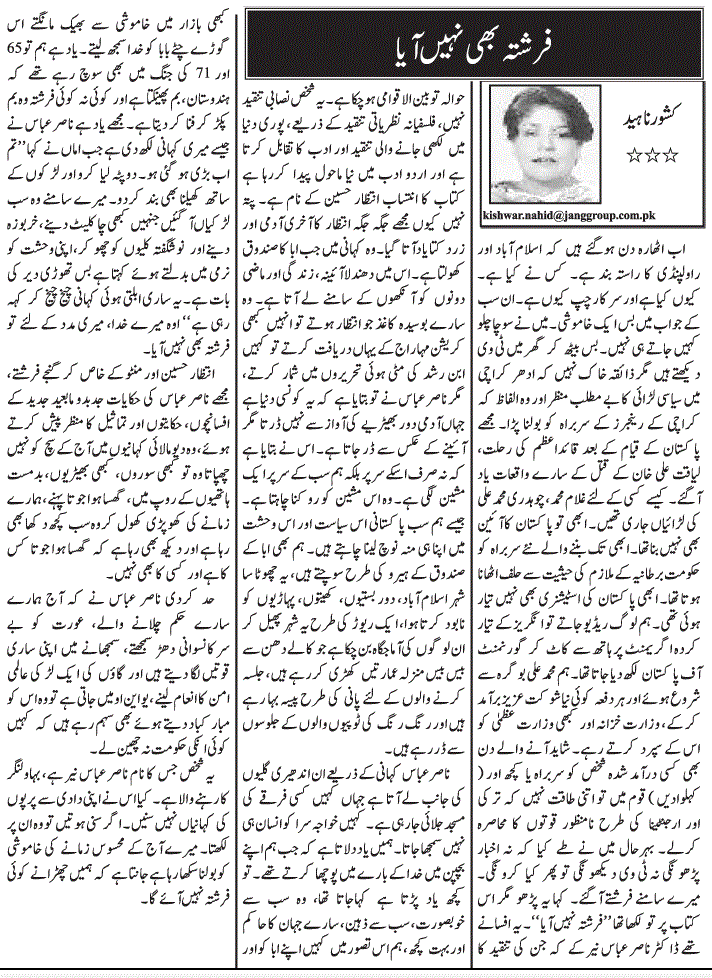
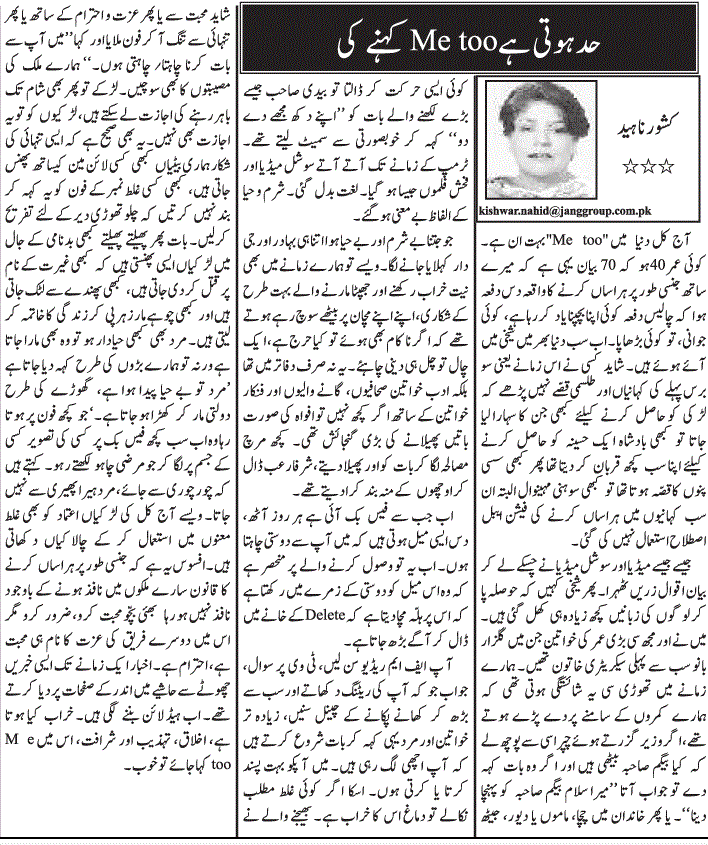
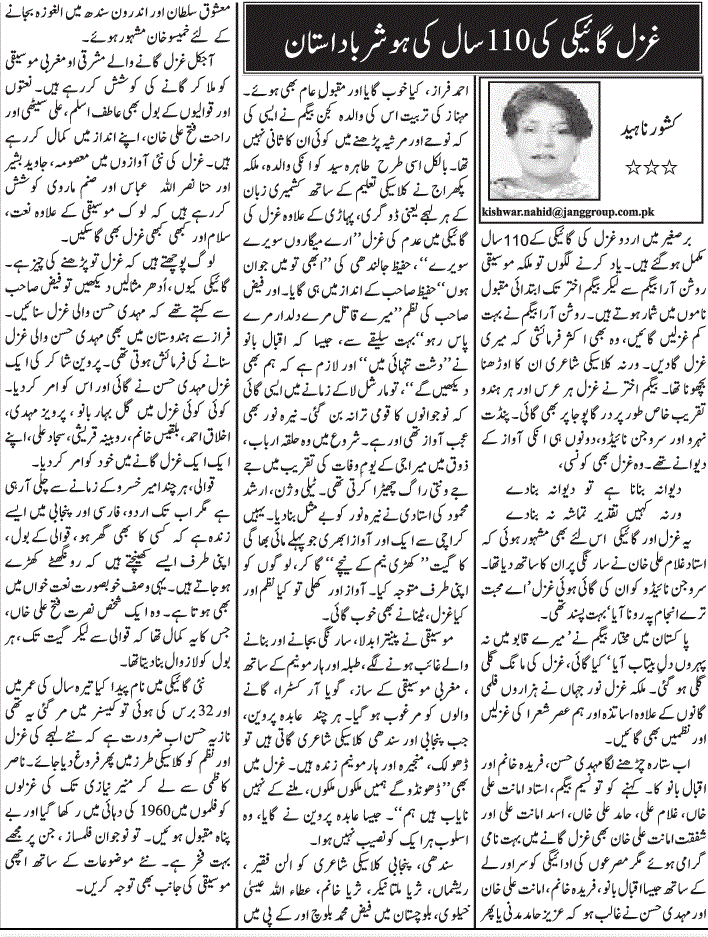
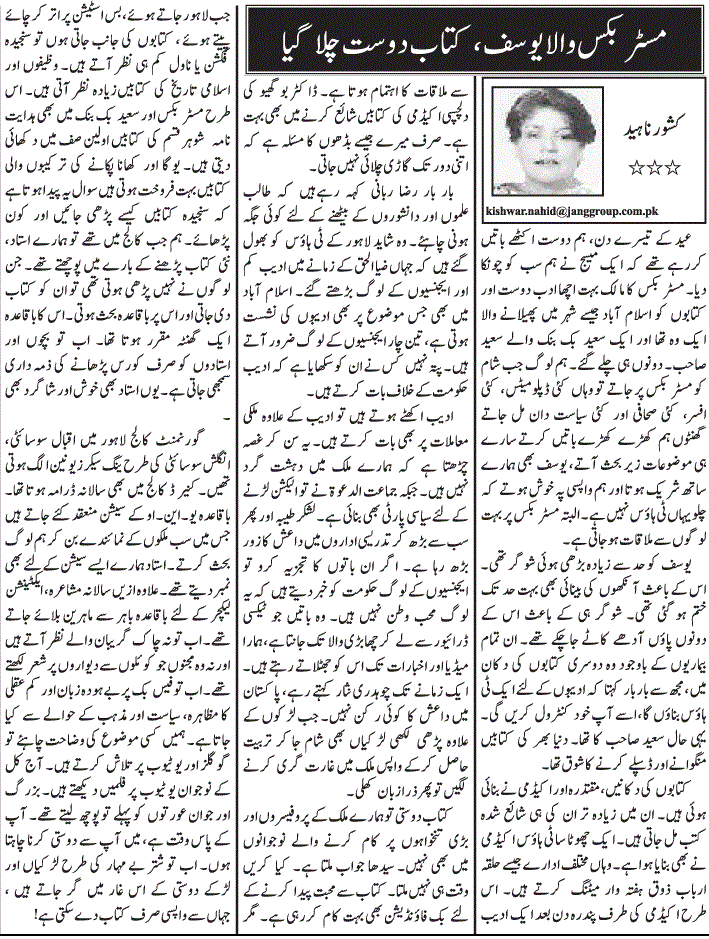
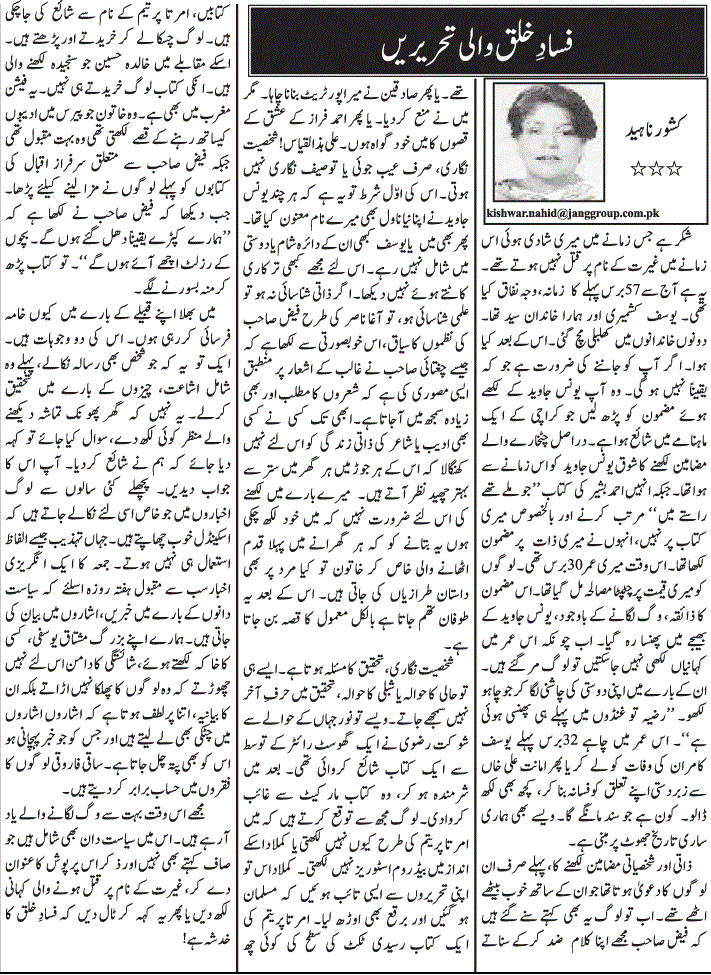
An
interview with feminist poet
Kishwar Naheed
Published
in HERALD- Dawn PAKISTAN - Mar 08, 2017 by Harris Khalique
“It is only us – the poets and writers of
Pakistan – who have never let down the oppressed and the condemned in our
society. We have kept alive the struggle for individual liberties and
realisation of human rights of common people,” proudly claims Kishwar Naheed —
the arch feminist poet of our times.
Kishwar Apa – as she is
fondly called by the young and the old alike – celebrates her 75th birthday
this year. In the artistic and literary circles as well as among political
workers, trade unionists, journalists and diplomats in Islamabad, she is
considered the matriarch of culture and resistance. With eight collections of
verse, a pungent collection of personal memoirs, pen portraits of writers and
artists, and translations of some key feminist literary texts from other
languages into Urdu behind her, Naheed is more prolific than most of her
contemporaries. Besides, she writes a regular weekly newspaper column and is
widely acclaimed for her sharp and incisive poetic expression, for being bold
and direct, and, for celebrating the universal human struggle for equality,
justice and freedom.
She champions the cause of peace in South Asia and
has played a significant role in promoting Pakistan India People’s Forum and
South Asian Association for Regional Cooperation (Saarc) Writers Forum. She has
participated in global literary and cultural movements bringing together
writers and artists who believe in a fair and equitable global political order.
Recently, her powerful poems against extremist religious thought, violence,
terrorism and increased suffering of women and girls due to radicalisation have
created waves locally and internationally.
Following are the excerpts of a conversation with
Naheed.
Harris Khalique.
What has fundamentally shaped you, your mind, your ideology and your
writing?
Kishwar
Naheed. Some months after the Partition of
India – a little before we moved to Lahore from Bulandshahr – I saw something
which left a lasting impression on my mind and my heart. The pain and sadness I
felt in those moments have stayed with me forever. Some Muslim girls who
belonged to Bulandshahr were kidnapped during the Partition riots. Either they
succeeded in running away from their captors or were rescued, they arrived back
in Bulandshahr. Some were known to our family and I accompanied my mother and
sisters to go see them. They looked haggard, exhausted and broken. Surrounded
by other women who were trying to console them, they were all lying down on the
floor or reclined against the walls in a large room. The feet of these women
were badly bruised and soaked in blood. That was the moment when I stopped
being just a child and became a girl child. I became a woman. Today, I do not
remember their faces but I vividly remember those blood soaked feet. Women and
girls anywhere have their feet soaked in blood. Very little has changed over
the decades. This must end.
Also, as a young girl, I was inspired by the
girls who had started going to Aligarh Muslim University in those times. The
white kurta and white gharara under a black burqa that they wore looked so
elegant to me. I wanted to go to college, to read and write.
My father,
Syed Ibne Hasan, was the secretary of All India Muslim League in Bulandshahr.
He distributed sweets on the creation of Pakistan and was jailed soon
after.
Khalique. What were your childhood and early years
like?
Naheed. Well,
they were all right in the sense that I had loving parents and siblings. But,
as a girl, it was a terribly difficult childhood and teenage. For instance, I
was made to wear the burqa when I turned seven. However, you will find it
amusing that the burqa was briefly removed when we took a flight from Delhi to
Lahore as a burqa-clad girl would not pass for a nine year old and a discount
ticket could not have been purchased for her. My mother had sold her jewellery
to buy us air tickets so that we could travel safely. But as soon as we landed
in Lahore, I was asked to put on the burqa again.
Ours was a typically
conservative Muslim Syed family of northern India. When I was growing up, the
family elders were waiting for respectable Syed grooms to appear for my two
elder sisters and take them away. Also, the family suffered hugely due to the
Partition and the subsequent migration. My father, Syed Ibne Hasan, was the
secretary of All India Muslim League in Bulandshahr. He distributed sweets on
the creation of Pakistan and was jailed soon after. As soon as he was released
on parole, he fled to Lahore. We were left behind but joined him after some
time. He refused to file any claims for property as it stood against his
political conviction and commitment to the new country. This meant difficult
times for all of us. My parents with seven children, four girls and three boys,
stayed in one room in my aunt’s old house in Anarkali. Then we moved to Garhi
Shahu where I insisted on attending the local girl school. After matriculation,
there was a lot of resistance to my taking admission in college. But my
brother, Syed Iftikhar Zaidi, paid for my tuition and helped me continue my
formal education.
I completed bachelor of arts in 1959 and master's in
Economics in 1961 from Punjab University. Earlier, I had finished Adeeb Fazil
in Urdu and learnt Persian. I had become a voracious reader in my teenage. I
read everything that I chanced upon — ranging from the works of Dostoyevsky to
the dictionary published by Neval Kishore Press. It sounds funny how one could
actually read a dictionary but I actually did that and I think it helped me in
some sense. I am happy that I refused to read [the Islamic fiction written by]
Naseem Hejazi even then.
Khalique.
You are a feminist but, of course, your work is not just about women. It calls
for a wide ranging social change, a pro-people polity and economy. Other than
your commitment to women’s rights and liberties and influences of people like
Simone de Beauvoir (who you have translated into Urdu) and Virginia Woolf, who
else among writers have inspired you most?
Naheed. Progressive politics
and free thinking is in my blood. I was deeply influenced by the Progressive
Writers’ Movement in South Asia and the ideals of socialism and the quest for
the empowerment of the masses worldwide. I see the years between 1956 and 1960
as my formative years. I was fortunate to have grown in a Lahore where Sufi
Ghulam Mustafa Tabassum, Ehsan Danish, Syed Abid Ali Abid, Mukhtar Siddiqui,
Faiz Ahmed Faiz and some others like them were living and writing. I learned
from them and was introduced to international literature during the 1960s.
Zahid Dar, who is nothing but a bookworm, used to share with me books of
literature written in other languages and cultures. Almost all Russian and
Soviet literature was made available by People’s Publishing House in
Lahore.
It was in the early 1960s when the short-lived traditional phase
of my poetry was completely over. Poet Iftikhar Jalib, who later moved to
Karachi, was my class fellow. He and I started writing and experimenting with
newer forms: free verse, blank verse and prose poems. That was the time when I
graduated from Daffodils to Waste Land. Out of my meagre salary, I would spend
a third on buying books every month. I think [the amount] came to hundred
rupees in those days but a large number of books could be purchased [with
it].
Two things were happening at the same time in those years. There
were major international political upheavals; Pakistan was under martial law
and new ideas and forms were being introduced and appreciated in our
literature. I and my friends saw ourselves as a part of everything. One day we
would take a procession out in support of Gamal Abdel Nasser and the Egyptian
right over Suez Canal, the next day we would bring out a rally for Vietnam or
Palestine or Latin America.
Khalique. One understands that your primary passion is literature but you
have a deep interest in politics. Let me put to you a clichéd question but I
think it is still up for debate. Do you think creativity can be regulated to
support a certain kind of politics?
Naheed. No.
Creativity cannot be regulated nor should it be. Who would know this better
than a woman writer or artist who has to struggle all her life to be able to
express what she feels and thinks, to be able to articulate the way she wishes
to articulate, to be able to present to the world what she wishes to present in
her own unique way. You know, even Yousuf Kamran – who was my friend before
being my husband – would discourage me from writing bold poems. Ghazals were
fine but my nazms would make him nervous. I, therefore, decided not to read to
him or show him my work before it was pulished. He would then read it the way
others read it.
But we must not forget that creative writers and artists
do not live in isolation. It is natural to react to and comment on the
political and social circumstances in which one lives. On one hand, it is said
that creative people are more sensitive and concerned while, on the other hand,
it is argued that they must confine themselves to writing about themselves or
their inner feelings. It is fine that we should write about our inner feelings
but when Malala [Yousafzai] was shot or girl schools in Swat were being razed
to the ground, it was my inner feeling that I wrote about. My poems will now be
seen as a critical social comment and some may call these political poems but
these poems represent my inner feelings.
Creativity cannot be regulated
nor should it be. Who would know this better than a woman writer or artist who
has to struggle all her life to be able to express what she feels and thinks,
to be able to articulate the way she wishes to articulate, to be able to
present to the world what she wishes to present in her own unique
way.
Khalique.
Undoubtedly, as you mention, women faced enormous problems in expressing their
ideas, feelings and creativity in the past. But different women writers reacted
to the situation differently. There are two distinct streams among women
writers and poets. We are meeting on the day when Ada Jafri has passed away in
Karachi. She was one of our major women poets but represented a different
literary tradition and perhaps used a more conformist style in expression if I
compare her to you and Fahmida Riaz. How do you see the contribution of women
poets and writers like her?
Naheed. Not just in
the past. It still is the case for many women that they face huge issues when
wanting to write or publish. But yes, I agree, things have changed for the
better in many instances and for many women. This freedom to write and express
has come through a struggle drenched in tears.
Coming back to your
question, I think Ada Jafri and women poets like her have made a serious
contribution. From Mah Laqa Chanda to Rabia Pinhaan to Ada Jafri to Parveen
Shakir, there is a galaxy of women poets. For a woman to write poetry and then
to get it published was a revolutionary step in itself during those times when
Jafri started writing and publishing. She and Sahab Qizilbash were two women
who took on the challenge and continued writing and publishing. As far as I can
recall, even they couldn’t publish for some years after getting married.
Shabnam Shakeel – another of my bright contemporary poets – also disappeared
from the literary scene for some years after getting married.
Myself and
Riaz – who came soon after me – represent a different thought process, a
different ideology and a different world view. That reminds me of Zehra [Nigah]
Apa. She is an amazing poet who inspired me the day I saw her for the first
time in a mushaira held in Punjab University. It was 1954 and she had come to
read her poetry from Karachi — a unique feat in those times for a young woman
poet. She was an instant hit and prevailed over the audience like no other. I
recall overhearing a conversation about her at the university bus stop next
day. A man was telling another man that someone else must be writing for that
girl who dominated the mushaira last night. I felt that was outrageous. I
wanted to write poems myself and read out in public like Zehra Apa did that day
but it was harder to make a name for yourself if you were a woman. People doubt
your talent more if you are a young woman.
Khalique.
How about your professional career? You worked as a government servant for long
– even under martial rule – didn’t you?
Naheed. I come from a
different generation when opportunities were limited for us and we had to earn
our living. I worked without making compromises as I never viewed myself as a
government servant. I was a servant of the state and tried my best to promote
and protect the rights of the weak and the oppressed, the women and the
marginalised. Promoting art and culture was my preoccupation in the hardest of
times. Even after being a public servant, my children and I lived under
constant surveillance and threat under Gen Ziaul Haq, [forcing] both my sons to
leave the country. I live alone in Islamabad today after moving here from
Lahore in 1994. I have paid a price for being what I am and what I stand
for.
Before I was inducted into the information cadre of public service
in 1972 and while working at the Department of Films and Publications as an
editor of the Urdu literary journals – I also worked with the local government
department in Punjab in 1960s. That was the time when I had a chance to go to
villages across Punjab and work with women. The sordid reality of Pakistani
society and the treatment meted out to the oppressed Pakistani woman was fully
revealed to me then. Therefore, upon retirement from the information service as
the director general of Pakistan National Council of the Arts in 1998, I made a
conscious decision to establish a non-governmental organisation (NGO) Hawwa
Crafts as a cooperative for women artisans. This is a small initiative that
removes the role of middleman from the lives of a few hundred women and their
households. I could do this much and make no big claims.
Khalique. Many people
think that NGOs are not the answer. The right wing sees NGOs as a western ploy
and the left wing sees them as a phenomenon that depoliticises society. Do you
agree?
Naheed. Answer to what? Who has said that they can replace the role of
the state and of the political parties? There are many NGOs which I would not
approve of but there are many businesses, media people and civil servants who I
don’t like either. I think NGOs are being demonised systematically, not only by
bigots and so-called religious leaders but also by Pakistani media.
Criticising NGOs for standing up for the rights of women has become a fad in
news analysis as well as in soaps and plays on popular media. If an
organisation campaigns for children to be sent to schools or women not being
beaten up or human rights of all citizens to be safeguarded or sanitation
services provided to all, should we rubbish them by branding them as agents of
the West? Strange, very strange.
I think NGOs are being demonised
systematically, not only by bigots and so-called religious leaders but also by
Pakistani media.
As far as the left leaning liberals and leftist political
leaders and intellectuals are concerned, where is their politics today, where
are the roots and where is the relevance? I wish they prosper and succeed but
it is us, the writers and poets, who have kept the desire and struggle for
change alive in the imagination of people. It is these NGOs who kept the social
issues on the agenda, be it about women or minorities, at the time when
Pakistan was under martial rule or under right wing civilian rule. It is not
the social movements and civil society organisations we should be worried about
so much. It is the Taliban, Daish and other such phenomena that should bother
us. I maintain that the United States and its allies have brought so much
suffering upon us. Nevertheless, extremism and terrorism is our issue — in
spite of whatever role we think the western governments have played – and are
playing – in promoting or curbing [extremism and terrorism]. I also think it is
not just about poverty as some of our friends say when it comes to the roots of
radicalisation. I still find urban Pakistan more radicalised than rural
Pakistan.
Khalique. It is a grim picture that you paint when it comes to our
society and politics. Is there any hope for us? Also, is there hope for our art
and literature in these testing times?
Naheed. In the short
run, it seems there is little hope. But in medium to long run, things are bound
to get better. Currently, all our political leaders are weak and insecure.
There is no exception if you ask me. Religion is being worn on sleeves by those
who claim to be pluralistic otherwise. But I believe in the democratic process.
I believe in the potential of our people, our girls and women, our students and
youth, our workers and peasants, and, above all, Pakistani writers, poets,
artists and journalists. They have the potential to change the course. There is
little state patronage and no encouragement for people with talent but we are
still producing remarkable people in all fields.
I also don’t agree with
some cynics when they say that nothing is happening in art and literature. They
should read works appearing in Seraiki and Sindhi, for instance. There is a
tendency among influential English-speaking Pakistanis to consider works in our
own languages inconsequential. I have no issues with those writing in English
as they more quickly link us to the rest of the world than those writing in
Urdu but our writers who do not write in English must not feel insecure.
Pakistan’s genius is realised in Urdu and the languages that our common people
speak and write in. In the final analysis, it is the content that matters and
not the language that you use. But we do need good translations of our literary
works in English and other languages. Our young people who know English or
other international languages well may consider learning Urdu and their mother
tongues with as much fervour as they learn English or French and then translate
the literary works of our languages into others.
